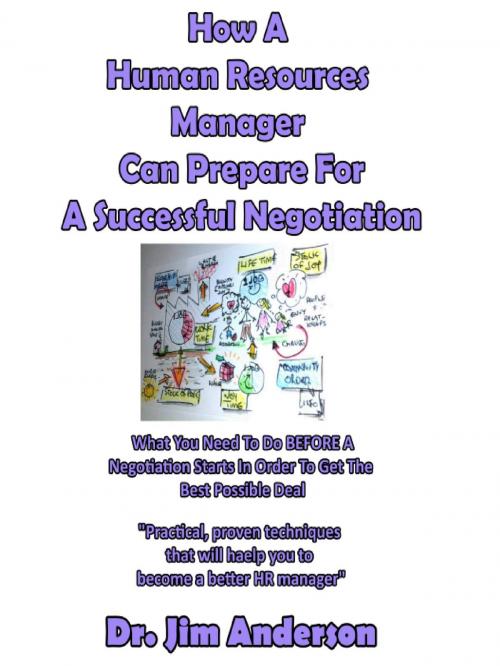How A Human Resources Manager Can Prepare For A Successful Negotiation
Business & Finance, Management & Leadership, Negotiating| Author: | Jim Anderson | ISBN: | 9781370924691 |
| Publisher: | Jim Anderson | Publication: | November 20, 2016 |
| Imprint: | Smashwords Edition | Language: | English |
| Author: | Jim Anderson |
| ISBN: | 9781370924691 |
| Publisher: | Jim Anderson |
| Publication: | November 20, 2016 |
| Imprint: | Smashwords Edition |
| Language: | English |
It turns out that most negotiations are over even before they begin. The HR manager that has spent the most time planning for the negotiation, doing their homework, and collecting the data that they'll need is the one that's going to walk away from the table with the best deal and a sense of winning. Wouldn't you want that person to be you?
What You'll Find Inside:
* THE 7 DEADLY SINS OF PREPARING TO NEGOTIATE
* DEALS THAT MAKE MONEY: HOW TO PLAN YOUR CONCESSIONS
* CLOSE MORE DEALS: UNDERSTANDING BUYER POWER & WHAT TO DO ABOUT IT
* SINGLE VS TEAM NEGOTIATION: WHICH IS BETTER?
Planning is what happens before a HR manager sits down at the negotiating table. There are no negotiating tactics or tricks at play here. It's just a matter of you doing your homework. At the same time you hope that the other side is NOT doing their homework so that you'll show up at the negotiation more prepared then they are.
Just committing to doing the planning that your next negotiation is going to require is not enough, you also have to know just exactly how to go about doing it – you have to think about the offers and counter offers that are going to be made. That's what this book is going to teach you. Every negotiation is different and so the planning that you'll have to do for each negotiation will be different also.
The planning that is required for a successful negotiation takes on many different forms. These can include planning where and when the negotiations will be held, what concessions you'll be willing to make to the other side, and understanding who has what power in the negotiations.
The end result of doing the planning that a negotiation requires is that when you sit down at the negotiating table, you'll have a sense of being prepared. You'll know what you need to know about the other side of the table, what their goals are, what their constraints are, and what they hope to be able to get out of the negotiations. This is exactly the type of knowledge that every person who lives in the world of human resources is going to need in order to be able to reach the type of deal that will allow you to walk away from the table with a sense of having closed a deal that is good for both you and your company.
It turns out that most negotiations are over even before they begin. The HR manager that has spent the most time planning for the negotiation, doing their homework, and collecting the data that they'll need is the one that's going to walk away from the table with the best deal and a sense of winning. Wouldn't you want that person to be you?
What You'll Find Inside:
* THE 7 DEADLY SINS OF PREPARING TO NEGOTIATE
* DEALS THAT MAKE MONEY: HOW TO PLAN YOUR CONCESSIONS
* CLOSE MORE DEALS: UNDERSTANDING BUYER POWER & WHAT TO DO ABOUT IT
* SINGLE VS TEAM NEGOTIATION: WHICH IS BETTER?
Planning is what happens before a HR manager sits down at the negotiating table. There are no negotiating tactics or tricks at play here. It's just a matter of you doing your homework. At the same time you hope that the other side is NOT doing their homework so that you'll show up at the negotiation more prepared then they are.
Just committing to doing the planning that your next negotiation is going to require is not enough, you also have to know just exactly how to go about doing it – you have to think about the offers and counter offers that are going to be made. That's what this book is going to teach you. Every negotiation is different and so the planning that you'll have to do for each negotiation will be different also.
The planning that is required for a successful negotiation takes on many different forms. These can include planning where and when the negotiations will be held, what concessions you'll be willing to make to the other side, and understanding who has what power in the negotiations.
The end result of doing the planning that a negotiation requires is that when you sit down at the negotiating table, you'll have a sense of being prepared. You'll know what you need to know about the other side of the table, what their goals are, what their constraints are, and what they hope to be able to get out of the negotiations. This is exactly the type of knowledge that every person who lives in the world of human resources is going to need in order to be able to reach the type of deal that will allow you to walk away from the table with a sense of having closed a deal that is good for both you and your company.















